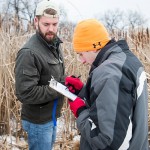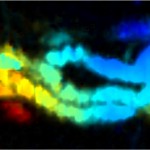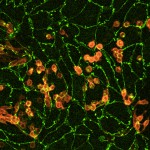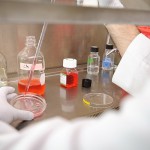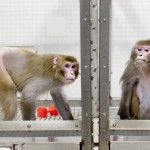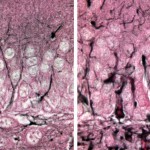Tag Animal research
Learning lessons by following Madison’s foxes and coyotes
Last year, a family of foxes — complete with roly-poly kits — took up residence on the University of Wisconsin–Madison campus and made the city its playground. With winter in full swing, the foxes and their larger dog-like counterparts, coyotes, are out there again, roaming the wilder (and often not so wild) parts of the city and campus. This year, David Drake, a UW–Madison associate professor of forest and wildlife ecology, is welcoming the public to join him and his research team as they go out and radio collar the animals in an effort to track and better understand these urban canids.
AAAS honors four UW–Madison professors for advancing science
Four members of the University of Wisconsin–Madison faculty have been elected fellows of the American Association for the Advancement of Science (AAAS), the society announced today.
Morgridge scientists find way to ‘keep the lights on’ for cell self-renewal
One remarkable quality of pluripotent stem cells is they are immortal in the lab, able to divide and grow indefinitely under the right conditions. It turns out this ability also may exist further down the development path, with the workhorse progenitor cells responsible for creating specific tissues.
Animal research ethics discussion to focus on UW anxiety study
Bioethicist Jeffrey Kahn and veterinary pathologist Eric Sandgren will meet on the University of Wisconsin–Madison campus Thursday evening for a discussion of animal research ethics focusing on a particular program employing monkeys in the study of anxiety and depression. The event, which is free and open to the public, begins 7 p.m. Thursday in Room 1111 of the Genetics-Biotechnology Center Building, 425 Henry Mall.
Wisconsin scientists find genetic recipe to turn stem cells to blood
The ability to reliably and safely make in the laboratory all of the different types of cells in human blood is one key step closer to reality. Writing today (July 14, 2014) in the journal Nature Communications, a group led by University of Wisconsin–Madison stem cell researcher Igor Slukvin reports the discovery of two genetic programs responsible for taking blank-slate stem cells and turning them into both red and the array of white cells that make up human blood.
Chemical strategy hints at better drugs for osteoporosis, diabetes
By swapping replacement parts into the backbone of a synthetic hormone, UW–Madison graduate student Ross Cheloha and his mentor Sam Gellman, along with collaborators at Harvard Medical School, have built a version of a parathyroid hormone that resists degradation in laboratory mice. As a result, the altered hormone can stay around longer - and at much higher concentration, says Gellman, professor of chemistry at the UW.
Genes found in nature yield 1918-like virus with pandemic potential
An international team of researchers has shown that circulating avian influenza viruses contain all the genetic ingredients necessary to underpin the emergence of a virus similar to the deadly 1918 influenza virus.
Foxes among Badgers: A family of foxes makes its home on campus
There are foxes on campus. Big ones and little ones, a new family that started this spring.
Hair from infants gives clues about their life in the womb
Like rings of a tree, hair can reveal a lot of information about the past.
Monkey caloric restriction study shows big benefit; contradicts earlier study
The latest results from a 25-year study of diet and aging in monkeys shows a significant reduction in mortality and in age-associated diseases among those with calorie-restricted diets. The study, begun at the University of Wisconsin–Madison in 1989, is one of two ongoing, long-term U.S. efforts to examine the effects of a reduced-calorie diet on nonhuman primates.
UW–Madison, USDA enter into settlement agreement
This month, the U.S. Department of Agriculture (USDA) and the University of Wisconsin–Madison entered into a settlement agreement resulting in a fine of $35,286.
Halting immune response could save brain cells after stroke
A new study in animals shows that using a compound to block the body’s immune response greatly reduces disability after a stroke.
Study suggests potential association between soy formula and seizures in children with autism
A University of Wisconsin–Madison researcher has detected a higher rate of seizures among children with autism who were fed infant formula containing soy protein rather than milk protein.
Famed Milwaukee County Zoo orangutan’s death caused by strange infection
Mahal, the young orangutan who became a star of the Milwaukee County Zoo and an emblem of survival for a dwindling species, led an extraordinary life. It turns out, the young ape died an extraordinary death, too.
A shift in stem cell research
A team of engineers at the University of Wisconsin–Madison has created a process to improve the creation of synthetic neural stem cells for use in central nervous system research.
Researchers Link Protein With Breast Cancer’s Spread to the Brain
A cancer-research team at the University of Wisconsin–Madison has identified a protein that may be a major culprit when breast cancer metastasizes to the brain.
Estrogen: Not just produced by the ovaries
A University of Wisconsin–Madison research team reports today that the brain can produce and release estrogen - a discovery that may lead to a better understanding of hormonal changes observed from before birth throughout the entire aging process.
Rare disease yields clues about broader brain pathology
Alexander disease is a devastating brain disease that almost nobody has heard of — unless someone in the family is afflicted with it. Alexander disease strikes young or old, and in children destroys white matter in the front of the brain. Many patients, especially those with early onset, have significant intellectual disabilities.

